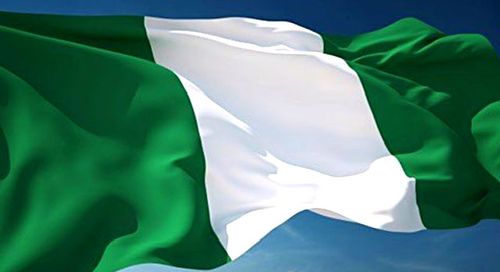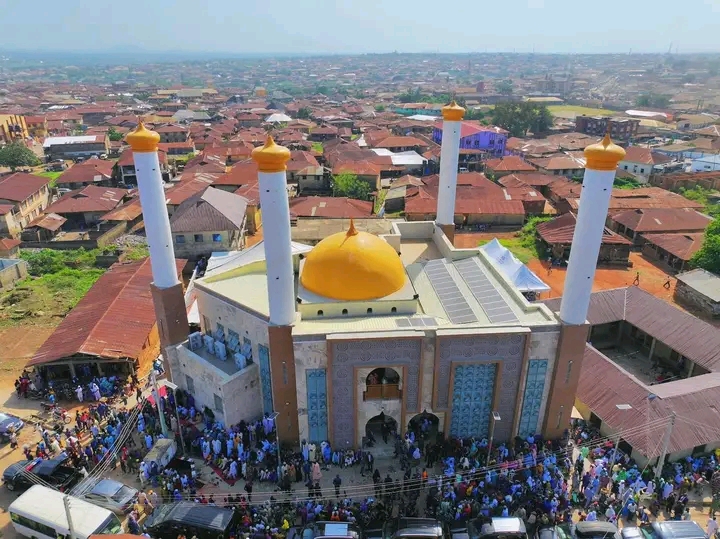OPINION: Readoption of the Old National Anthem: A Strategic Attempt to Revamp Nigeria From the Root
By Minkail Olaitan
Nigeria is a country endowed with a rich history and a stunning sifting of underlying stories that substantiate the efficacy of her history. It’s critical yet interesting that the topic currently occupying the minds of millions of Nigerians is the restoration of Nigeria to its former national anthem, ditching the one that I grew up learning and instilling in my head a trash receptacle of time. As notable as the invocative call to responsibility issued by Arise, O Compatriot, to every of its voicers and the inconceivable impact it exerts, the call penetrates the core of your being and jolts the nationalistic spirit to life. It’s of paramount significance to conduct an intellectual inquisition on the decision to return to the old anthem as well as sneak into the vantage point where President Bola Ahmed Tinubu made the resolute decision.
Advertisement
In January 1959, in preparation for the celebration of yet-to-be-officially declared independence, the Nigerian National Planning Committee for Independence announced a contest to select a national anthem to honour the Federation of Nigeria’s independence on October 1, 1960. The competition was open to both Nigerians at home and in the diaspora, and the winner received a prize of $280 at the time. It must also be stressed that a panel of six judges made up of seasoned music experts was set up, comprising the famed Mr. Fela Sowande, Mr. O. Omodeyi, Mr. T.K.E. Phillips, Mrs. H. Lawson, Mrs. M. C. Majekodunmi, and Mr. W. C. Echazona, who put their expertise and experiences together to select the most soothing, captivating, and perfect National Anthem from the pools of submissions they must have had at the time.
After what must’ve been a thorough, challenging, and exciting process of making a choice, considering the arguably astounding quality of submissions, the judges selected “Nigeria, We Hail Thee” by Frances Benda’s as the winning entry. It would be redundant to start analyzing Frances Benda’s national work; numerous respected scholars had expended a great deal of effort and enthusiasm in doing that, and their contributions in that respect remain a goldmine for budding Nigerian enthusiasts to explore as archives. This is, however, a personal resolve; there is nothing universal about it. Everyone can choose to review and conduct an intimate analysis of the heroic entry of Frances Benda. Instead, I’d chosen to conduct critical analysis on the underlying factors that contributed to the efficacy of Nigeria’s first ever national anthem, its leitmotif, the artistic and spiritual significance of the song, the present atmospheric exploration, and the need for time—all while standing at a vantage point with President Bola Ahmed Tinubu with the same periscope.
Advertisement
Prior to the day of independence, Nigeria experienced a bout of pan-Africanism, which spread the idea of national self-determination and nationalism. It’s noteworthy that the agenda of frontier trailblazers who spent themselves in this remarkable cause was to fight for independence. This unifying spirit erased ethnicity, religious disparity, and social and cultural differences and instead implanted the deep-rooted spirit of brotherhood and oneness, which was the major powerhouse for the success of the struggle. This may be seen as a fact underscored by the razor-minded Frances Brenda in his illustrious attempt to capture the chain of events that animated a unified spirit lucidly and powerfully in his entry. First, respectfully hailing Nigeria displays impressive and spirited intimacy and commitment, as well as loyalty to Nigeria. The following line of the anthem then silenced the whispering tendency of diversity, which occurs to be the characteristic trait of Nigeria because of the unprecedented nature of the marriage of people of different cultures and backgrounds together to form an entity by the colonial masters. In a very unique marriage to one’s identity, Frances Brenda intentionally discouraged the diversity and instead proclaimed and distilled the unity, commitment, national pride, resilience, and love in the usage of “brotherhood” and in regarding Nigeria as “our native land” and equally a “motherland,” which not only echoes the strength and rigidity of a father but also the loving, compassionate attitude of a mother, whose life is animated by possibilities.
Being a compatriot is an implication stemming from the sincere nature of deep-rooted friendship with one’s partner, which is directly the result of genuine brotherhood. Obviously, Nigeria has long deviated from the spirit that characterized the struggle and the feelings that anchored the struggle for independence, which in the long run is undeniable in the introduction of the immediate past National Anthem. The most significant difference is, however, caused by the nature of the socio-political and economic climate of the country at the time. Composers, like writers, are the most listening birds of their societies; they share the minds of their environments in profound ways, which is why the linguistic, allusion, choice of words, instances employed, and most silent elements of their works are sponsored by environmental influences, like happenings (disasters, remarkable events, political events, etc.). It’s quite appropriate to highlight that the notable change in the mental, psychological, and emotional factors in the National Anthem is a consequence of a change in time and occurrence. The feelings also changed alongside, though not quickly realized, until it’s evident that our psychological realm has been distuned from the ones that perceived the progress of our native land as common responsibility to the one that echoes our differences across ethnic lines.
Advertisement
In response to the reintroduction of the old National Anthem, concerned citizens and opposition warriors have shaped their mouths into bayonets and launched into the jugular of the sheer decision-making of President Bola Ahmed Tinubu’s and his administration. This exercise has shades, but the most repressive among them is the taunting question, which, if studied from the surface, sounds both humane and compassionate and concerning to the wellbeing of Nigerians. Until one is granted the fortitude to study through the curtain and arrive at the erroneous intentions that sponsored the whole disparagement — another interesting revealer of how far-apart the nation has been in its attempt of unification and spirit of camaraderie. Although this change in the Nigerian National Anthem might not seem like a good decision, particularly in such a tough time as this, it must be understood that the true worth of a progressive leader is to ensure the followers express the same level of loyalty he shares with his Nigeria, the same mental capacity, and the same ability to believe staunchly in the potential of our native land to attain a remarkable degree of development and prosperity. While this is not to present him as the most patriotic person, rather, it’s to believe in his attempts at national mental and psychological redetermination and reinvention. Truthfully, the National Anthem won’t reduce fuel prices, pay minimum wages, or restore economic stability and growth; nonetheless, it can be highlighted that we are dragged here naked because we didn’t work together and our perception of our country is animated by differences.
Edward Bulwer Lytton, in his take on the role of musical sound in the transformation of a man, stated, “Music, once admitted to the soul, becomes a sort of spirit and never dies.” Ruminating on this is the idea of changing the national anthem to one that poses solutions to the immediate mental problems and distorted perception of the statehood of Nigeria. In his attempt to address the importance of sound (musical sounds), Plato, one of the luminary Greek philosophers, reveals the essence of music: “Music is a moral law. It gives a soul to the universe, wings to the mind, flight to the imagination, a charm to sadness, and life to everything. It is the essence of order and leads to all that is good, just, and beautiful, of which it is the invisible but nevertheless dazzling, passionate, and eternal form.” It becomes wholesome when psychologically, sound like, the National Anthem has in it infinite power to influence emotions, behavior, cognition, and physical well-being, and it can be used as a tool to promote relaxation, focus, and overall well-being, as well as the ability to evoke deep emotional responses to its role in memory.
Advertisement

The ‘CityBoy’,’ as Mr. President is fondly called during his campaign, is an apparent meliorist and Nigerialist to the core, such that in his recent interview, he expressed his concern and belief in the importance of his decisions so far, particularly over the changing of the National Anthem, reflected upon the significance of the new Anthem, and confidently emphasized his love and hope for unity in Nigeria. Over a stretch of time, since the inception of the nation-state characterized by self-determination, territorial integrity, and sovereignty, which was the implication of the Westphalia Peace Treaty. Every nation-state afterwards became so determined in their pursuit of national unity and in entrenching national feelings and values. One of the most powerful means of aligning citizens minds and emotions with their native country is through the organinative, emotional, and spiritual sound of the national anthem, where the efforts of the independent frontiers, sheer unity, and spirit of brotherhood, loyalty to the native community, and respect are distilled and powerfully expressed. This means it has contributed immensely to the reinvigoration of a nation’s strength, the strengthening of unity, and the heightening sense of pride and belonging to the cohesive family of a country.
In conclusion, it is evident that, like the highly respected Martin Luther King Jr., Mr. President is on the mountaintop, brimming with hope and confidence in the future of Nigeria. Now is the time to work together to overcome this obstacle. Without a doubt, as a nation, we have been scratching the surface of our predicament for decades, and we have yet to make attempts at shifting the monumental status of our psychological system as citizens, though they seem so unrealistic and too flimsy to be a problem-solving attempt. Nevertheless, a great leader will not leave the minds of his followers (fellow citizens) untouched. Nigerians need thorough detoxification and mindfulness; a state with an unprogressive mindset, leaders, and followers with notable diversity and incoherent communication is susceptible to defeat in all fields. To see the positive side of his leadership and its impact on the country.
Every Nigerian should view the recently adopted National Anthem as a patriotic invocation and emblem of duty and loyalty that must be embraced with commitment and unflinching dedication to the progress of our motherland in cohesive unity deeply rooted in the spirit of brotherhood. Let us see this as the activation of a tiny yet lucid whisper into the core of each of our beings as a road map to genuine love, respect, hope, harmony, and progress.
Olaitan writes from Ogbomoso; can be contacted via email at @olaitanminkail100@gmail.com






